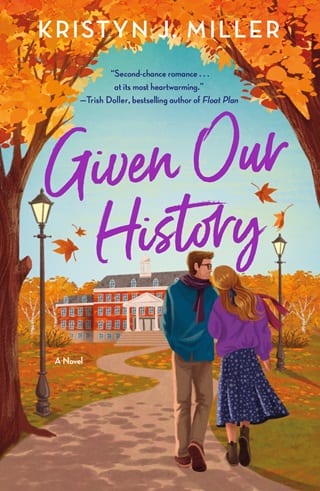Chapter 28
CHAPTER
28
PRESENT
I spend Friday washing bedsheets, Swiffering the hardwood floors, and scrubbing the grout on the countertops, as though Izzy’s going to march in here tomorrow and immediately swipe the nearest surface to inspect it for dust. I’m pretty sure I could live in a hovel, for all the difference it would make to her, but it helps keep my mind off things. Thick snowflakes whirl beyond the kitchen window as I toss empty bottles of salad dressing and overripe fruits from the fridge. The weather hasn’t relented since this afternoon; there’s five inches on the ground and counting, unusual for December in Maryland, but there are no signs of it stopping.
As terrible as I feel admitting it, I wish I hadn’t promised to pick Izzy up from the airport tomorrow morning. It’s all just been… a lot, the past couple of days. I didn’t hear from Teddy all day yesterday—not that I blame him. We left things where we’ve pretty much always left them: inconclusive. Except I know that if I let him walk out of my life again, this time he won’t come back.
Maybe I’m letting my stubbornness get the best of me. It’s not like he’s asking me to move closer to Pittsburgh, rewrite my entire life. On the contrary, he’s offering to follow wherever I go. Some would call that romantic. Izzy certainly would. Maybe a love like that is wasted on me. I never sat around dreaming about meeting my soulmate, falling in love. Maybe that’s because I met the only person for me when I was fourteen. Love never had to be added to my list of never-ending goals because it was just… already there. A constant in my life, something I took for granted, and I didn’t quite appreciate it until it was long gone.
When my phone chimes in my pocket, I straighten up in the middle of wiping out the bottom shelf of the refrigerator to check it. But it’s not Teddy. It’s an email from Julien, and the subject line makes my stomach bottom out.
From: Julien Zabini ([email protected])
To: Clara Fernsby ([email protected])
Date: December 13, 6:12 P.M .
Subject: Tenure Decision Letter
Clara,
Attached is the decision letter from the tenure advisory board. I know it’s not quite what we hoped for, but it’s not all bad. Let’s discuss.
J
I take a long and measured breath. Okay. Sounds like they rejected me. I can’t say I didn’t have time to prepare myself for this, but I’m feeling a little nauseated anyway. I open the letter, because why not? Better to get it all over with at once. It’s a PDF file, the letter emblazoned with the university crest:
Professor Clara Fernsby, History Department
University of Irving
1200 E Richmond Ave
Irving, MD 21532
Dear Clara,
I am writing as a follow-up to our meeting on Wednesday. I’d like to thank you once again for taking the time to meet with us and your patience in answering our questions.
I scoff at this, because I don’t think I was all that patient. I was pretty short with them, actually. But I keep on reading.
I regret to share that opinion was divided in regard to your application for tenure, with the majority feeling that your application was premature. While we are immensely grateful for your contributions to our university, particularly your growing collection of published works and your extradepartmental activities, we ultimately felt that your overall relevant experience was lacking. This opinion was conveyed to the president, who elected not to move forward with your case for tenure.
We would, however, like to invite you to apply for an associate professor opening for the upcoming academic year. I’d also invite you to reapply for tenure again once you’ve reached the seven-year mark; while your career shows promise, the committee is in agreement that we’d like to see a couple of years’ more experience under your belt before considering your application again.
Warm regards,
Andrew Greene, Ph.D.
Chair
Tenure Advisory Committee
I kneel in front of the refrigerator, scanning the letter again. It’s not unheard of for assistant professors to be offered a slightly better position in lieu of tenure, but I’m not even sure they’re offering—just inviting me to apply. I wait to feel something. Indignation, maybe. But I’m numb.
It was always a long shot, securing tenure so early in my career. I don’t resent them for denying me. I don’t resent Julien for encouraging me to apply. I don’t feel anything. It’s as though suddenly, out of the blue, the thing I’ve put first for my entire life—my career, my professional reputation, my future—it doesn’t matter to me either way.
Reagan skirts around me as she enters the kitchen, tossing me an odd look. She grabs a mug from one of the overhead cupboards and fills it beneath the tap. “What’s the matter with you?”
I glance over at her. “They rejected my application for tenure.” It comes out sounding so calm, measured. I stuff my phone back in my pocket and drag myself to my feet, collecting the sponge and spray bottle of disinfectant that I was using to clean out the fridge. I set them on the counter.
Reagan tracks my movement. “I’m sorry,” she says after a minute. It’s uncharacteristically gentle, coming from her. But then she adds, “They’re a bunch of fucking fossils.”
I sputter a laugh, but she’s not even smiling.
“Seriously,” she says. “They don’t know what they’re missing out on. You’re pretty much the smartest person I’ve ever met.”
My gaze snaps to hers. She just shakes her head at me, her jaw set, like she really believes what she’s saying. It makes me feel a little less numb, maybe. I’m tempted to hug her, but I’m not sure how that would go over.
“They also invited me to apply for an associate professor position,” I say. “It’s not tenure, but it’s still a step up.”
She rolls her eyes—now that’s a Reagan face I’m much more familiar with. I press my lips together.
“You’re not going to apply,” she says, disbelieving.
I don’t say anything.
“Nope,” she says. “No way. You give them the middle finger. There’s literally no other option.”
It’s a little melodramatic, all things considered—the advisory board hasn’t directly insulted me. Or maybe they have, but c’est la vie, because when you’re a young woman in academia, there’s bound to be some old guy lurking around the next office over, looking for an excuse to call you incompetent. Inexperienced. Whatever.
I lift my shoulders and let them drop. “I don’t know.”
“What does Teddy think?”
“We haven’t really talked about it.”
She sets her mug on the counter. “Well, why not?”
“Because it’s my decision,” I say, though even to my own ears, it sounds like a half-hearted excuse. “And whatever he does is his.”
“Are you kidding me right now?” She tosses up her hands. “It’s like you’re determined to waste your whole life sitting in the fig tree.”
I blink at her. “The what?”
“It’s from Plath.” When I just give her a blank look, she prompts, “ The Bell Jar ? It’s a metaphor. Your life is split off in all these different branches. Work. Family. Love. ” She places extra emphasis on this last word, like she feels the need to make sure I understand she’s talking about my relationship and not my job. I glower. “You convince yourself that you have to choose just one, only one fig, but you can’t decide which branch to pluck from, and you take so long to make up your mind that you never reach for any of them, and they all start to go bad, and at the end of the day you’re left with nothing because you were too scared to choose.”
She’s rambling now. Not unlike the way I sometimes ramble, like when I’ve bottled something up for so long it just comes spilling out, and once it starts, there’s nothing I can do to stop it.
Yup. It’s word vomit.
“Except for you”—she flings a hand at me, her voice pitching up—“you’re convinced you’ve already picked your fig and you’re just going let all the other ones rot. Perfectly good figs!” She finishes her rant with an emphatic swing of her arm.
“I’m trying to think about what’s best for everyone,” I snap. “Including you.”
She scrunches her whole face in a frown, incredulous. “What does this have to do with me?”
“Your tuition. The student loans. If I’d accepted an offer of tenure, the school would’ve covered half the cost. But a promotion, that’s almost as good. I’ll just have to help you out of my own pocket.”
She shakes her head. “I don’t want it.”
“What are you talking about?”
“I don’t need you to make this decision because of me,” she says. I don’t think she realizes, and I’m not about to be the one to point it out, but she sounds like me. “This has nothing to do with me.”
“So you’re going to make a poor financial decision because of your stubborn—”
“Stop mothering me!” she explodes. “I’m not a child and you’re not Mom.” For a moment, I’m stunned into silence, and she takes advantage of it. “Ever since Dad’s injury, it’s like you decided that it’s your life’s purpose to do better than they did, like you can fix it—”
I find my voice, but she continues talking right over me, both of us half shouting. “I wouldn’t have to mother you if you didn’t act like—”
“—already applied for a scholarship, so I don’t need your stupid money—”
“—or showed even a modicum of responsibility.”
We finish at the same moment, only half hearing what the other said because we both wanted to say our piece. It takes me a few seconds to process the bits I did hear, but when I do, I look at her with fresh eyes. “Sylvia Plath,” I say, disbelieving.
“What about her?” Reagan snaps.
“You wrote the essay for the, which one”—I snap my fingers—“the Lizette Woodworth Reese Award.”
She makes a sound that’s probably meant to be a sarcastic laugh, but it comes out a little strangled. “That’s a mouthful.”
I’m not laughing. “Did you write it?”
She seems to hesitate, jiggling her leg. “I wasn’t supposed to tell you,” she mumbles finally. “Since you’re on the panel or whatever. They told me I’d be disqualified if you knew.”
I nod to myself, bracing my hands on the kitchen counter, coming to a fast realization. I’ll have to step down from the scholarship committee. No official decisions have been announced yet. If I step down now, I remove myself from the equation. Goodman would temporarily succeed me as chair. At least until they could find someone else for the job. And in the meantime, they’d probably still grant the scholarship to Reagan, without my input.
I cast her a sideways glance, guilt creeping over me. “I’m sorry for shouting,” I mumble.
She stares at the floor. “I’m sorry, too.”
I know better than to press my luck by asking her for a hug right now, but I make a mental note to hug her more often.
I slap cables on my tires before driving into the city early Saturday morning to grab Izzy from the airport. Perhaps too early Saturday morning—traffic’s cut in half on the weekends, and I arrive with a whole hour to spare, so I pull over to the curb and search on my phone for the nearest coffee shop with a decent rating. Hot Off the French Press. I set it as my destination and drive a couple blocks over, parking on the street and feeding some change from my cupholder into the meter. It hasn’t snowed yet in Baltimore, but it’s drizzling. The café is part of an old strip, gold peel-and-stick letters affixed to the window beneath a scalloped black-and-white awning.
Wait a second. I glance up and down the narrow one-way street, déjà vu washing over me. I’ve been here before. I remember the old-fashioned awnings, the comic book store next door, the Chinese restaurant just past it. And if I kept walking, just another door down…
Still, I’m not about to waste time driving around to find a different coffee shop, so I pop inside. It’s cramped inside, but the coffee smells amazing, rich and earthy. An espresso machine hisses and trickles, steam rising from somewhere behind the counter. I order two black coffees to go, stop by the self-serve station to stuff a couple creamers and stir sticks in my pocket, and then I’m back out the door. I wait at the curb for a semi-truck to amble down the narrow road and then I walk around to the driver side, setting the coffees on the roof of my car so that I can unlock the door. I’ve really got to look into buying a new car—one with a working key fob, for example.
“Clara?”
There’s that déjà vu again.
I peek over the top of my car. A woman stands on the sidewalk, car keys in one hand and a plastic bag in the other. She’s got the hood of her raincoat thrown over her head. “Sorry. I knew I recognized that car.” When I only gape at her, she points at herself with the keys. “Mindy Schooner.”
Time stands still on the quiet side street. There’s something surreal about seeing her here, now, just a few doors down from the sandwich shop. “I didn’t think you still lived in Baltimore.” It comes out sounding more accusatory than intended.
“I live just over that way. Wyman Park. Been in the same apartment for years.”
I realize that I’m standing in the middle of the street and I move a little closer to the curb.
“I was craving a turkey melt”—she lifts the bag—“and nobody does it like Augie’s, so…”
We stand there for a moment, the silence so thick you could almost reach out and swipe it away, like snow collecting on a windshield. “It’s nice to see you,” I say. “You look great.”
By this I mean: you look healthy, happy. But it comes out sounding, at least to my ears, like you look different. Mellowed, somehow, and I wonder whether that’s because of the years spent around Teddy or just getting older. It occurs to me for the first time that they might’ve been good for each other, in a way—not as life partners, but as life lessons, the sort of people who help you learn and grow, even if they don’t stick around for good.
“Well, happy holidays,” she says awkwardly, and she marches to her car a few meters away, unlocking it with a beep. A little shaken up, I start to climb into my car before realizing that I left the coffees sitting on the roof. I retrieve them, but not without glancing back at Mindy. She’s bent across the front seat, her yellow coattails sticking out of the driver side door.
“Hey,” I say, fully aware that I should probably just shut up, but I can’t help it.
She straightens up.
“I’m sorry if I wasn’t exactly friendly toward you in college. I’ve thought about it a lot since then and I think I might’ve been a jerk.”
She laughs under her breath. “A lot of us were jerks in col lege, in our own way. I mean, I sort of just… barged my way in. I always had a bad habit of doing that.”
“It’s not a bad thing,” I say, my voice small. “You kept things lively.”
She snorts. “A lot of good it did me. You certainly didn’t try to keep in touch with me afterward. No one did.” I have no idea how to respond to that, but she saves me from having to say anything by adding, “And that’s not me saying I want to be friends now, for the record.”
“Well, I’m sorry”—I give a small shake of my head—“if you were looking for friends and I wasn’t there. I sort of kept to myself, around that time. Head in the books and all that.”
She gives me a close-lipped smile that doesn’t quite reach her eyes. “That’s probably something the two of you had in common.”
There’s no need to ask who she’s talking about, but when I give her a quizzical look, she adds, “I realize that might sound sarcastic, but it’s really not. You guys make sense together. I just”—she lifts her shoulders and lets them drop again—“didn’t see it.”
 Fullepub
Fullepub 



